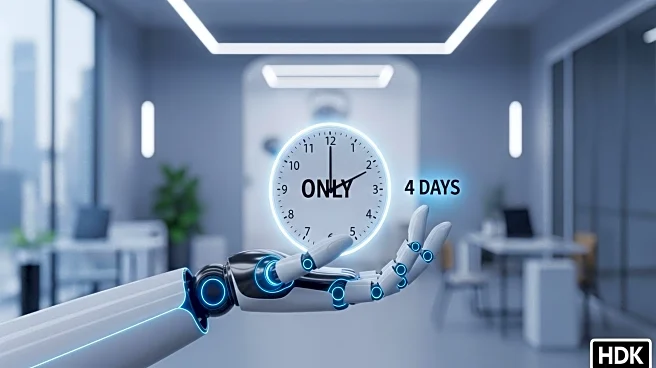What's Happening?
Several prominent CEOs, including those from Nvidia and Zoom, are advocating for a shift to a four-day workweek, driven by advancements in artificial intelligence (AI). Rita Fontinha, a researcher on workweek trials, has highlighted the benefits of shorter workweeks, such as improved work-life balance and increased productivity. Nvidia's CEO Jensen Huang and Zoom's CEO Eric Yuan have expressed optimism that AI could reduce the need for a traditional five-day workweek, suggesting that employees might only be required to work three or four days. This sentiment is echoed by Microsoft founder Bill Gates, who has speculated on even more radical changes to work schedules. However, concerns remain about potential job losses due to automation, with some experts warning of significant impacts on entry-level white-collar roles.
Why It's Important?
The potential shift to a four-day workweek could have profound implications for the U.S. workforce, affecting productivity, employee well-being, and economic structures. While AI promises increased efficiency, it also poses risks of job displacement, particularly in roles susceptible to automation. The enthusiasm for AI-driven workweek changes reflects broader trends in workplace innovation, but it also raises questions about the equitable distribution of benefits. Companies may face challenges in balancing productivity gains with workforce reductions, and policymakers might need to address the social and economic impacts of such transitions.
What's Next?
As discussions around AI and workweek changes continue, companies may begin experimenting with shorter workweeks to assess their viability. Policymakers and business leaders will need to consider strategies to mitigate potential job losses and ensure that productivity gains translate into tangible benefits for employees. The adoption of a four-day workweek on a larger scale could depend on successful trials and the ability to maintain employee compensation and benefits. Stakeholders will likely monitor developments closely to understand the broader implications for the U.S. economy and labor market.
Beyond the Headlines
The shift towards a shorter workweek could redefine cultural norms around work-life balance and leisure time. It may also prompt ethical considerations regarding the use of AI in workforce management and the responsibility of companies to support displaced workers. Long-term, this transition could influence societal attitudes towards work and productivity, potentially leading to new models of employment and economic participation.










